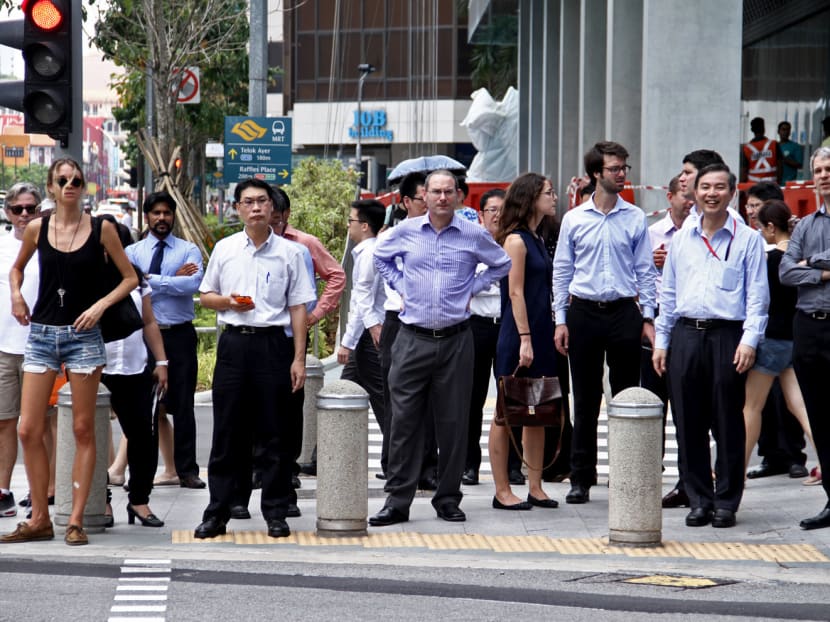Relevance of NWC guidelines questioned in light of Wage Model
SINGAPORE — As more sectors adopt the Progressive Wage Model (PWM), which maps out career pathways with recommended wages for different levels, the question of whether the quantitative guidelines recommended by the National Wages Council (NWC) remains relevant was raised yesterday.

People at the Central Business District. TODAY file photo
SINGAPORE — As more sectors adopt the Progressive Wage Model (PWM), which maps out career pathways with recommended wages for different levels, the question of whether the quantitative guidelines recommended by the National Wages Council (NWC) remains relevant was raised yesterday.
Asked how the model would impact future wage recommendations at the press conference on the council’s annual wage guidelines, National Trades Union Congress (NTUC) assistant secretary-general Cham Hui Fong said with wider adoption of the model, such recommendations by the NWC may no longer be needed. “Because by itself, (the PWM) would already spur the changes,” she said.
With productivity improvement, an increasingly skilled workforce and a tight labour market, these factors would “drive wages by itself”, rendering quantitative recommendations less relevant, she added.
Nanyang Technological University economist Walter Theseira agreed that growing adoption of the PWM would mean the general recommendations by the NWC become less important. But he also noted that many low-wage workers do not have a lot of bargaining power, which is why institutions such as the NWC are needed to ensure they are treated fairly.
“That’s why we have to be careful about not removing quantitative guidelines as long as they are useful. Because without them, I think it may be hard to safeguard the welfare of these workers,” he added.
The NWC is a tripartite body comprising employer, union and government representatives. Set up in 1972, at a time when Singapore was rapidly industrialising, the NWC’s main purpose is to formulate guidelines that are in line with long-term economic growth.
In 2012, it broke away from its tradition of issuing only qualitative wage guidelines by recommending a minimum quantum of S$50 in the form of a raise for workers earning up to S$1,000 each month. Then, there were also calls for the NWC to overhaul its approach and focus on improving the lot of low-wage workers.
Labour Members of Parliament (MP) disagreed that the NWC guidelines as a whole could lose relevance.
NTUC assistant secretary-general Zainal Sapari pointed out that the PWM is a salary structure without emphasis on wage increments, unlike the NWC guidelines.
Mr Patrick Tay, also an assistant secretary-general at NTUC, highlighted that the guidelines apply to all employees and not merely low-wage workers. “That’s something we want to draw attention to as well. It’s not just for low-wage workers, and we hope that the Professionals, Managers and Executives (PMEs) and re-employed workers are also fairly remunerated,” he said.
As more sectors are encouraged to adopt progressive wages, unionists are hoping that the wage threshold for the quantitative wage increase recommendations could go up in years to come.
Currently, four in five members of the Union of Security Employees are paid S$1,100 or less each month. But when the PWM for the security sector kicks off next July, all full-time security officers will be earning basic monthly wages of S$1,100.
“We have registered this point with several government agencies to review,” said Mr Hareenderpal Singh, the union’s president. He hopes that the threshold could increase to between S$1,200 and S$1,300, depending on the economic outlook.
Mr Hassan Abdullah, president of the Attractions, Resorts and Entertainment Union, said: “From a union’s perspective, more workers can benefit.” About one in 10 union members draw monthly salaries below the wage threshold, he added.
However, labour MPs felt a careful review of wage data is necessary before reviewing the threshold. “Instead of looking at the wage level per se, we want to focus on what is the target group and see what is the appropriate salary level to tack on to benefit the particular group,’ said Mr Zainal.
The Singapore National Employers Federation also welcomed the recommendations, but acknowledged that smaller companies may find it challenging to meet the recommended guidelines.
Its president Robert Yap said companies that are not doing as well need to examine the reasons and tap on productivity incentives, and explore new ways to train and upskill workers to make the company more competitive. Siau Ming En and Valerie Koh






